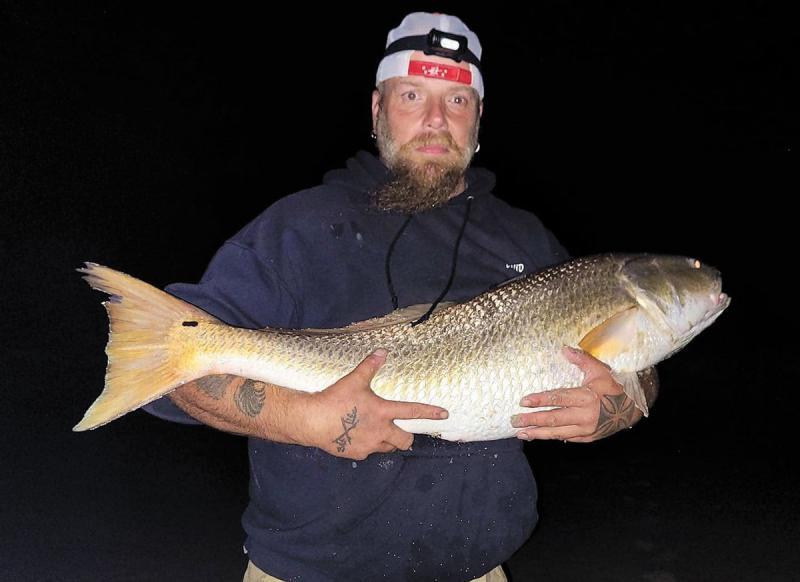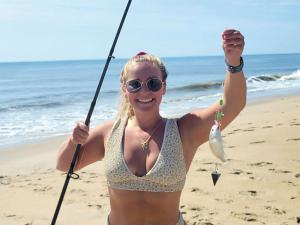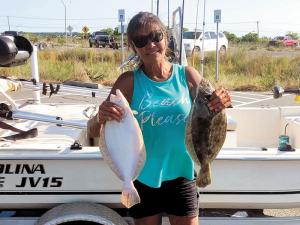It’s the fish’s job to get off the hook
Summer fishing is in full swing at the beach, the bays and offshore. There’s a lot going on in the water depending on what you want to target. This makes for more options and a better day; if you get skunked with one species you can try for something else or fish for both at the same time. But if all four rods bend over, you have fast decisions to make. One reason to limit the number of rods you set out is so you can control your catches better. Fewer lines decrease the catch odds but increases the landed fish factor. It is the fish’s job to get off the hook.
The flounder fishing inshore, in the bays, off the pier, and offshore has been good, meaning it has been about normal for Delaware waters. The charters targeting flounder are doing well and picking up a lot of ribbon fish to boot. Those ribbons are good to eat but are annoying to clean. Drifting Gulp, Fishbites Fight Club, or minnows, kayak fishing or from the boats off and inshore, have been best. Jigging the surf and piers work well for the land-based anglers targeting the flat fish.
Summer striped bass slot season is from July 1 to Aug. 31. The Delaware Bay and her tributaries are legal for keeping the summer slot striped bass. The Lewes Canal is legal from the Kings Highway bridge to Roosevelt Inlet.
Broadkill River is a tributary as is Canary Creek in Lewes. There has been some really good action in the Lewes Canal fishing structure and piers. Cape Henlopen State Park pier also has some decent action for slots or short striped bass. Up north, the action in the tidal creeks and rivers is best at the bridges. The slot season does not apply to the inland bays or their tributaries, and that includes the Indian River Inlet. If you are traveling by boat, possession of summer slot striped bass would be a violation in any waters as they are not legal to possess. The limit is one fish per angler at 20 – 25 inches.
Surf fishing is still productive for kingfish, spot, croaker, sand perch, small weakfish, short striped bass, and the occasional bluefish. How you rig and bait up will govern the catches. Top and bottom rigs from DS Custom Tackle and Fishbites are favorites. They are great rigs with very sharp hooks that grab fish. Fishbites are not as messy and work well. Bloodworms are still a little hard to find and the prices are up. Many of the Fishbite formulas are working, including bloodworm, crab, sand flea and clam. A lot of new anglers are learning and hooking up catches. According to Suzanne Martin, who was fishing with her neighbor, “Bella was having some problems with her rod, and had freshwater gear, but she came out to learn saltwater. I went over and asked her if she wanted some help. She was more than happy for some help, so I took her over to the truck and rigged her up with a DS Custom Tackle top and bottom rig, and a 4-ounce pyramid sinker. A few casting lessons and she lobbed it out there and caught a few fish. It made my day.”
There are many fish species on the wrecks and reefs now too, including ribbon fish, triggers, sheepshead, bluefish, flounder, and Spanish mackerel, to name a few. You just have to get a boat and get out there. The charters are filling up daily and have options, so check them out.
Crabbing and clamming have been decent. The local oyster farmers are harvesting loads of fresh yummy oysters. There are a lot of white legger crabs around the inland bays for some reason -killer red drum bait.
The migratory striped bass and drum are still around, just slower random catches. A lot of sharks are being caught now from the beaches. It’s that time of year. There are also huge summer rays and whiptail rays – the kind that can clear your legs out from under you with one sweep.
I’m not even going to bother with the weather. This mild to inferno summer has been great for the fishing so far. Usually by now the inland bays are boiling hot and we worry about vibrio. The waters will be bathtub warm soon enough.
Night fishing is hot for short striped bass at the Indian River Inlet using sand fleas. It is an easy technique: Just hook a few fleas on a 4/0 to 6/0 circle hook, on a leader with zero weight, then throw some fleas into the water to “seed” the rocks. The fish go nuts - cast your line into the seeded area and hold on. Those little fish hit hard, and it’s a lot of fun.
Occasionally you might see a keeper caught this way. This also works around the Delaware Bay for slot striped bass.

























































